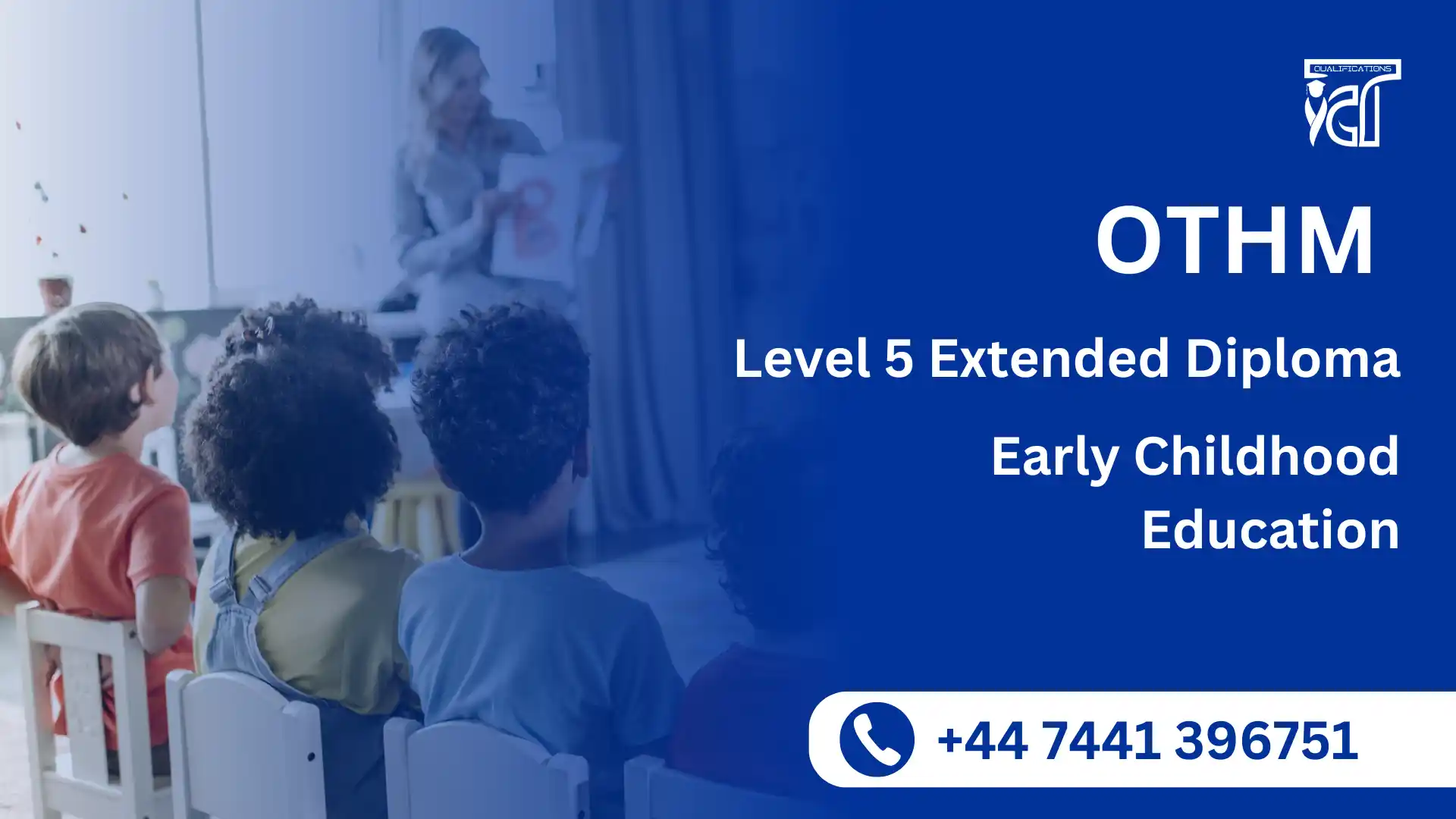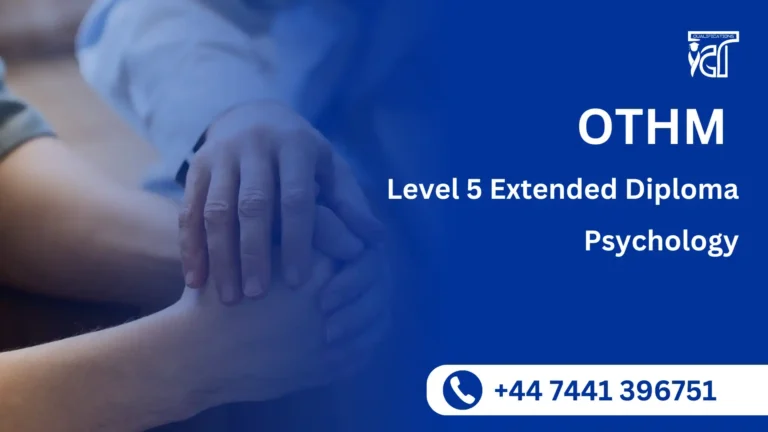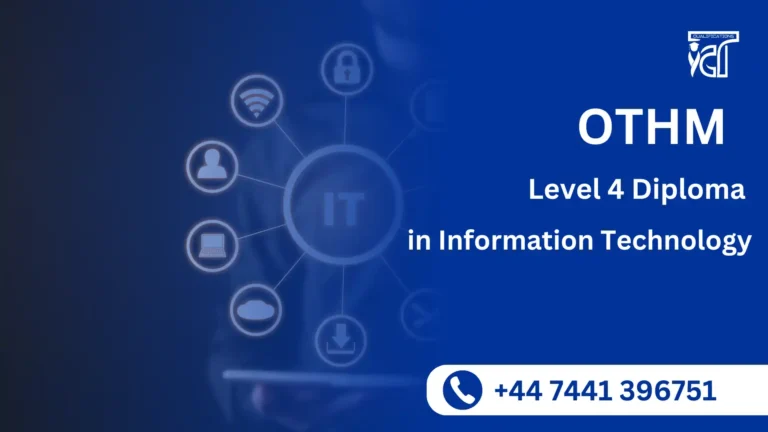The field of early childhood education plays a crucial role in shaping young minds and preparing them for a successful future. As the demand for qualified educators continues to rise, gaining a recognized qualification in early childhood education is key to advancing your career. The OTHM Level 5 Extended Diploma in Early Childhood Education is a comprehensive, Ofqual-regulated qualification that provides individuals with the essential skills and knowledge to excel in this rewarding field. This qualification is entirely assignment-based, offering flexibility and practical learning that aligns with real-world teaching practices.
The OTHM Level 5 Extended Diploma in Early Childhood Education is an advanced qualification designed for those looking to deepen their understanding of early childhood development, education practices, and management. As an Ofqual-regulated qualification, it is recognized across the UK and internationally, making it a highly credible and valuable certification for educators. The course covers a broad range of topics that focus on the development of children, effective teaching strategies, and the management of early childhood education settings.
This diploma is assessed through assignments, rather than exams, which provides a more practical and flexible approach to learning. Students have the opportunity to apply their knowledge directly to real-life situations, fostering a deeper understanding of early childhood education.
The OTHM Level 5 Extended Diploma in Early Childhood Education is a valuable qualification for individuals looking to advance their career in early childhood education. Whether you’re starting out in the field or seeking to enhance your existing skills, this Ofqual-regulated qualification offers a flexible and practical learning experience. With a comprehensive curriculum, no exam-based assessments, and global recognition, it is the ideal choice for those looking to make a positive impact on the lives of young children and advance in this rewarding field.
OTHM Level 5 Extended Diploma in Early Childhood Education
The OTHM Level 5 Diploma qualifications reflect practical knowledge, skills, capabilities, and competencies that are academically recognized as equivalent to a Higher National Diploma (HND) and the second year of a three-year UK Bachelor’s degree program.
Mandatory units:
| Sr# | Unit Title | Credits | GLH |
|---|---|---|---|
| 1 | Academic Writing and Research Skills | 20 | 100 |
| 2 | Nurturing Growth and Development in Early Childhood | 20 | 100 |
| 3 | Fostering Collaborative and Inclusive Relationships in Early Childhood Setting | 20 | 100 |
| 4 | Learning and Development Through Play | 20 | 100 |
| 5 | Unlocking Words: Exploring Early Language and Communication | 20 | 100 |
| 6 | Early Personal, Social and Emotional Development | 20 | 100 |
| 7 | Exploring Early Years Pedagogy and Best Practices | 20 | 100 |
| 8 | Understanding Child Behaviour: Theoretical Perspectives and Insights | 20 | 100 |
| 9 | Inclusion and Diversity: Supporting Children with Special Needs and Disabilities in Early Education | 20 | 100 |
| 1 | Safeguarding; Child Protection and Keeping Children Safe | 20 | 100 |
| 11 | Emerging Literacies in the Early Years and Digital Resources | 20 | 100 |
| 12 | Understanding Transitions in Early Childhood | 20 | 100 |
GLH (Guided Learning Hours) and TQT (Total Qualification Time) are terms commonly used in vocational qualifications to help define the amount of time a learner is expected to spend on heir studies.
1. GLH (Guided Learning Hours)
GLH refers to the number of hours a learner spends being directly taught, supervised, or supported during their course. This includes the time spent in activities such as:
- Classroom instruction
- Practical workshops
- One-on-one tutoring or mentoring sessions
- Online learning sessions with tutor support
In other words, GLH represents the time that learners are actively engaged with their instructors or learning activities.
2. TQT (Total Qualification Time)
TQT represents the total amount of time a learner is expected to invest in completing a qualification, including:
- GLH (Guided Learning Hours): Time spent on direct learning, as explained above.
- Self-Directed Learning: This includes time spent on independent study, research, assignment completion, preparation for exams, and any other work the learner does outside of direct teaching hours.
TQT is a broader measure that includes all the time required to achieve the qualification. It helps learners and employers understand the overall commitment required for the qualification.
Key Differences Between GLH and TQT:
- GLH focuses on direct learning with guidance or supervision.
- TQT includes GLH as well as independent study time and other learning-related activities.
Example:
If a qualification has a TQT of 600 hours and a GLH of 250 hours, it means the learner should spend 250 hours in direct learning (classroom, online, or tutor-led sessions) and 350 hours on independent study or research.
Learning Outcomes of OTHM Level 5 Extended Diploma in Early Childhood Education
Academic Writing and Research Skills
- Understand the concept and purpose of academic research and writing.
- Understand how to conduct academic research.
- Be able to demonstrate critical thinking skills.
- Understand how to construct a reliable and valid academic argument.
Nurturing Growth and Development in Early Childhood
- Understand traditional and contemporary views and theories of growth and development
- Understand the role of reflexes and the role of the senses
- Understand locomotion
- Understand impacts of growth and development initiatives to support health and well being
- Understand traditional and contemporary views and theories of growth and development
Fostering Collaborative and Inclusive Relationships in Early Childhood Settings
- Understand the importance of promoting diversity, equality and inclusion
- Understand how to develop inclusive relationships through equality, diversity and anti-discriminatory practice.
- Understand barriers to parents being involved in their children’s early learning
Learning and Development Through Play
- Understand how play and learning activities promote children’s learning and development
- Understand curriculum approaches to outdoor play
- Understand how to support purposeful play
Unlocking Words: Exploring Early Language and Communication
- Understand the role of communication and language in children’s development
- Understand the development of communication and language
- Understand the critical periods of language development
Early Personal, Social and Emotional Development
- Understand different aspects of personal development
- Understand emotional development
- Understand social development
- Understand factors that might impact Personal Social and Emotional Development (PSED)
Exploring Early Years Pedagogy and Best Practices
- Understand the role of the pedagogue in supporting children’s learning and development
- Understand how to involve the family and the home learning environment
- Understand the concepts of making creativity part of the curriculum
- Understand the need to manage diversity and celebrate it within the curriculum
Understanding Child Behaviour: Theoretical Perspectives and Insights
- Understand theoretical perspectives of behavior
- Understand the social learning theory of child development
- Understand Vygotsky’s Sociocultural Theory
- Understand Bronfenbrenner’s Ecological Systems Theory
- Understand how factors such as parenting style; divorce and separation impact children’s behavior
Inclusion and Diversity: Supporting Children with Special Needs and Disabilities in Early Education
- Understand a wide range of special educational needs and disabilities
- Understand the principles of working inclusively with disabled children with specific requirements
- Understand how to work in partnership with parents and/or carers with disabled children with specific requirements
Safeguarding: Child Protection and Keeping Children Safe
- Understand current legislative frameworks and regulatory guidance
- Understand how to respond to allegations that a child has been abused or harmed
- Understand ways in which early years professionals can effectively contribute to safeguarding and keeping children safe
Emerging Literacies in the Early Years and Digital Resources
- Understand what emergent literacy is Understand the role of the adult in preparing children for reading
- Understand how to support children in making connections through early mark-making and writing development.
- Understand how to support children in making connections through early mark-making and writing development.
- Understand the use of digital resources to encourage reading
Understanding Transitions in Early Childhood
- Understand what ‘transition’ means
- Understand how transitions can be supported in the first 3 years of life.
The OTHM Level 5 Extended Diploma in Early Childhood Education offers a wide range of benefits, making it an excellent choice for individuals looking to advance their careers in the field of early childhood education. Below are the key advantages of pursuing this qualification:
1. Ofqual-Regulated Qualification
The OTHM Level 5 Extended Diploma is an Ofqual-regulated qualification, ensuring that it meets the highest academic standards and is widely recognized by employers, educational institutions, and professional bodies both in the UK and internationally. This accreditation guarantees that the qualification is of high quality and provides a strong foundation for further education or career advancement.
2. Practical, Assignment-Based Assessment
The qualification is assessed through assignments, rather than exams, which allows students to apply their learning in practical, real-world contexts. This assignment-based approach fosters deeper understanding and enables students to demonstrate their knowledge and skills effectively. The focus on practical assessment makes it highly relevant for those already working in the field or those looking to gain hands-on experience.
3. Comprehensive Curriculum
The course covers a wide range of essential topics in early childhood education, such as:
- Child Development: In-depth understanding of how children grow and develop physically, emotionally, and cognitively.
- Teaching Strategies and Pedagogy: Exploring effective teaching methods and approaches to promote children’s learning.
- Leadership and Management: Developing skills necessary for managing early years settings, including team leadership and operational management.
- Policy and Legislation: Understanding the legal and policy frameworks governing early childhood education.
- Safeguarding and Wellbeing: Learning the best practices to ensure children’s safety, health, and emotional wellbeing in educational environments.
This well-rounded curriculum equips students with the practical skills and theoretical knowledge needed to excel as educators and leaders in early childhood education settings.
4. Enhanced Career Opportunities
The qualification opens up a wide range of career opportunities in early childhood education, including roles such as:
- Early Childhood Educator
- Nursery Manager
- Early Years Practitioner
- Child Development Specialist
- Curriculum Coordinator
With the growing emphasis on quality early childhood education, the demand for qualified professionals is increasing. The OTHM Level 5 Extended Diploma ensures that you stand out in the competitive job market.
5. Global Recognition
As an Ofqual-regulated qualification, the OTHM Level 5 Extended Diploma is recognized internationally. Whether you’re planning to work in the UK or abroad, this qualification is valued by employers and institutions worldwide, giving you the flexibility to explore global career opportunities in early childhood education.
6. Pathway to Further Education
Upon completing the diploma, learners can progress to higher-level qualifications, including a BA in Early Childhood Education or other specialized postgraduate programs. The OTHM Level 5 Extended Diploma serves as a solid foundation for those seeking further academic advancement and specialized expertise in early childhood education.
7. Flexible Learning Structure
The course offers flexible, assignment-based learning, allowing students to study at their own pace. This flexibility is especially beneficial for working professionals or those with other commitments. Students can balance their personal, professional, and academic responsibilities while gaining valuable qualifications.
8. Development of Leadership and Management Skills
The qualification not only focuses on early childhood education theory and practice but also includes modules on leadership and management. These skills are crucial for those looking to take on senior roles, such as nursery managers or early childhood education directors. The ability to manage teams, develop educational programs, and handle administrative responsibilities is essential for career progression.
9. Improved Employability
The OTHM Level 5 Extended Diploma in Early Childhood Education is highly regarded by employers, providing graduates with an edge in the competitive early years job market. It demonstrates a high level of expertise in child development, teaching methodologies, and educational leadership, all of which are essential for successful careers in this sector.
10. Focus on Safeguarding and Wellbeing
The course places a strong emphasis on safeguarding and wellbeing, ensuring that students understand how to create safe, nurturing, and inclusive environments for children. This focus is crucial for maintaining the highest standards of care and education in early years settings, making graduates well-prepared to address the needs of diverse children.
The OTHM Level 5 Extended Diploma in Early Childhood Education is designed for individuals who are passionate about working with young children and wish to advance their knowledge and skills in early years education. Below is a breakdown of the ideal learner for this qualification:
1. Aspiring Early Childhood Educators
The ideal learner is someone who is looking to pursue a career in early childhood education and is eager to develop a deeper understanding of child development, teaching methods, and educational leadership. If you’re passionate about making a positive impact on young children’s lives and shaping their educational journeys, this qualification is a perfect starting point.
2. Current Early Years Professionals
Individuals already working in early childhood education, such as nursery assistants, child care workers, or teaching assistants, will benefit greatly from this qualification. The course provides an opportunity to enhance your skills, gain formal recognition for your experience, and progress into more senior roles, such as nursery manager, early childhood educator, or curriculum coordinator.
3. Parents or Caregivers Interested in Early Childhood Development
If you have children or work with young children in a non-professional capacity and are looking to gain formal knowledge about early childhood education, this qualification is ideal. It will equip you with a deeper understanding of how children learn and develop, which can be applied both professionally and personally.
4. Individuals Seeking Career Progression
For those looking to advance their careers in early childhood education, the OTHM Level 5 Extended Diploma is an excellent choice. It provides the necessary knowledge and skills to move into higher-level positions, such as early childhood education manager, child development specialist, or education policy advisor.
5. Learners with a Passion for Child Development and Pedagogy
The ideal learner should have a genuine interest in child development and education. If you’re driven by the desire to help young children reach their full potential and are keen to explore teaching strategies, child psychology, and inclusive education practices, this qualification will provide you with the academic foundation and practical expertise needed.
6. Professionals Looking to Specialize in Early Childhood Education
The course is also suitable for individuals from other educational backgrounds or those in related fields, such as social work or psychology, who wish to specialize in early childhood education. If you’re looking to shift your career focus to this area or expand your current role to include early years education, the OTHM Level 5 Extended Diploma provides a pathway for specialization.
7. Self-Motivated and Independent Learners
The OTHM Level 5 Extended Diploma is entirely assignment-based, meaning the ideal learner is someone who is self-disciplined and able to manage their own time effectively. As the course offers flexibility, learners will need to be proactive in meeting deadlines, organizing their study schedules, and completing assignments independently.
8. Individuals Looking for Flexibility in Learning
This qualification is designed for those who may be balancing their studies with personal or professional responsibilities. The flexible, assignment-based format allows learners to study at their own pace, making it ideal for those who need to fit their education around work, family, or other commitments.
Entry Requirements
Register Now
Qualification Process
Qualification Process OTHM Level 5 Extended Diploma in Early Childhood Education
- Self-Assessment:
Begin by evaluating your eligibility to ensure you meet the qualification requirements, including work experience, knowledge, and language proficiency. - Registration:
Complete your registration by submitting the required documents, including a scanned copy of a valid ID, and paying the registration fee. - Induction:
An assessor will conduct an induction to confirm your eligibility for the course and explain the evidence requirements. If you do not meet the criteria, your registration will be canceled, and the fee will be refunded. - Assignments & Evidence Submission:
Provide all assignments and the necessary evidence based on the assessment criteria outlined in the course. If you are unsure of the required evidence, consult with the assessor for guidance on the type and nature of evidence needed. - Feedback and Revision:
The assessor will review your submitted evidence and provide feedback. Evidence that meets the criteria will be marked as “Criteria Met,” while any gaps will be identified. You will be asked to revise and resubmit if needed. - Competence Evidence:
Submit final evidence demonstrating that all learning outcomes have been met. This evidence will be marked as “Criteria Met” by the assessor once it is satisfactory. - Internal Quality Assurance (IQA):
The Internal Quality Assurance Verifier (IQA) will review your evidence to ensure consistency, quality, and compliance with standards. - External Verification:
The IQA will submit your portfolio to OTHM External Quality Assurance Versifier (EQA) for final confirmation. The EQA may contact you directly to verify the authenticity of your evidence. - Certification:
Upon successful completion of all checks, OTHM will issue your official certificate, confirming that you have attained the OTHM Level 5 Extended Diploma in Early Childhood Education







